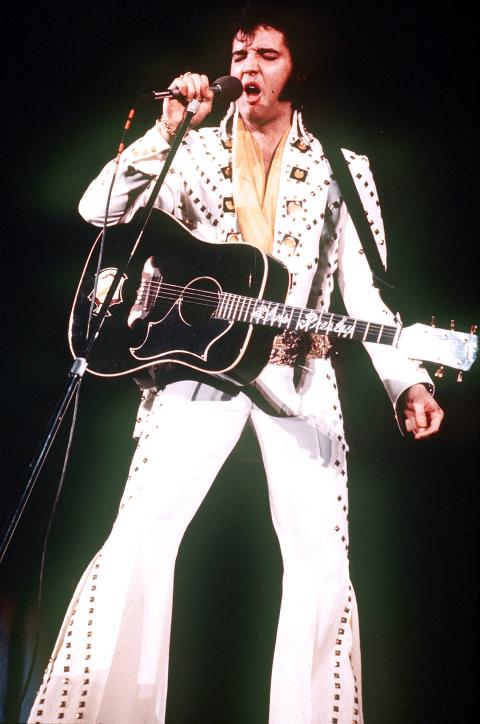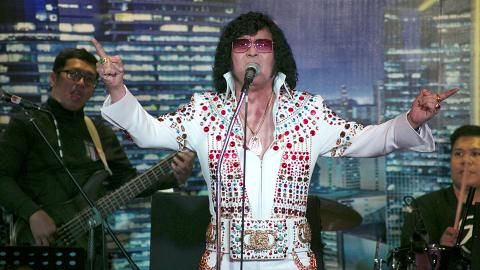Elvis Presley, American icon and King of rock ‘n’ roll, transformed popular culture, sold over a billion records and is idolized as ever on the 40th anniversary of his tragic death.
His Graceland mansion in Memphis, Tennessee — the second most famous home in the US after the White House — expects more than 50,000 people to descend for the biggest ever annual celebration of his life 40 years after his death aged 42 on Aug. 16, 1977.
Presley is considered the best selling artist of all time, shifting an estimated billion records. In 2016, Forbes ranked him the fourth highest earning dead celebrity at US$27 million, still moving a million albums.

Photo: AP
“He is the only person of modern times who is instantly recognizable throughout the world by his first name,” said British author and artist Ted Harrison, who has written two books about Presley.
“Say ‘Elvis’ in Beijing, Nicaragua, Estonia or Fiji and you get an immediate recognition across language and culture,” he said.
His unique voice and style blended R&B, blues, country, gospel and black music, challenging social and racial barriers at the time, and earning him the nickname “Elvis the Pelvis” for his gyrating moves.

Photo: Cecilia Forbes, AP
Oozing style, charisma and naked sex appeal, he was the fantasy of millions of women and inspired everyone who came after him, from The Beatles to The Rolling Stones to today’s chart-topper Bruno Mars.
“Hearing him for the first time was like busting out of jail,” Bob Dylan has said. In the late 1960s, the composer and conductor Leonard Bernstein called him “the greatest cultural force in the 20th century.”
‘CELEBRITY OF ALL CELEBRITIES’
Hits such as Heartbreak Hotel, Hound Dog, Jailhouse Rock and Are You Lonesome Tonight are instantly recognizable. His music has been reissued and repackaged countless times since his death.
More than 20 million people have visited Graceland, his home for 20 years, after Priscilla, his ex-wife and mother of his only child Lisa Marie, opened it to the public in 1982.
The estate says it pulls in 600,000 visitors a year and contributes around US$150 million a year to the Memphis economy. Neither is it showing any sign of slowing down. In March, it opened a brand-new US$45 million entertainment complex and hotel spread across 40 acres.
Die-hard fans are often moved to tears at his grave site at Graceland, where he is interred next to his beloved parents, Gladys and Vernon, and grandmother Minnie Mae, covered in flowers, tributes and mementos.
“It gives you that fire,” said Stephanie Harris, 42, from Michigan who sells life insurance. “His music is transcendent to our generation because there’s nothing like the Hound Dog baby.”
In downtown Memphis, home of the blues, you can buy everything Elvis — from Christmas tree decorations to luggage. Cardboard Elvis cutouts greet you outside bars and his music blares out of loudspeakers.
“He’s the celebrity of all celebrities,” said Lisa Bseiso, 36, who set up The Official Elvis Presley Fan Club of Qatar, the Middle Eastern kingdom where she was born and raised. “Forty years after his death, that’s why he’s a phenomenon. He’s still as powerful, as loving.”
BLACK MUSIC
Born to a truck driver father and sewing-machine operator in a two-room house in Tupelo, Mississippi, on Jan. 8, 1935, Presley grew up an only child after his brother was stillborn.
In 1948, he and his parents moved to Memphis, he graduated from high school, cut his first record aged 19 and became an almost instant star.
As an early rebel whose hip-swiveling, pulsating leg-tapping had conservatives up in arms, his music also crossed the racial divide in a South where the specter of segregation still loomed large.
“Far more worrying to many white Americans was the way he took African-American music and presented it mainstream,” says Harrison.
Then came a two-year stint in the US Army during the Cold War, he was shipped off to West Germany, promoted to sergeant and after leaving the military turned into a respectable family entertainer.
But if he embodied the American dream — the poor boy made good who doted on his parents and liked to buy Cadillacs for strangers off the street on a whim — he also personified American excess.
He became a total recluse, abusing a dizzying array of prescription pills, overate, becoming a bloated shadow of his once lithe self in declining health and plagued by poor management.
His last live performance was on June 25, 1977, in Indianapolis and on Aug. 16, 1977, the day before his next scheduled concert, he was found dead in his bathroom.

April 28 to May 4 During the Japanese colonial era, a city’s “first” high school typically served Japanese students, while Taiwanese attended the “second” high school. Only in Taichung was this reversed. That’s because when Taichung First High School opened its doors on May 1, 1915 to serve Taiwanese students who were previously barred from secondary education, it was the only high school in town. Former principal Hideo Azukisawa threatened to quit when the government in 1922 attempted to transfer the “first” designation to a new local high school for Japanese students, leading to this unusual situation. Prior to the Taichung First

The Ministry of Education last month proposed a nationwide ban on mobile devices in schools, aiming to curb concerns over student phone addiction. Under the revised regulation, which will take effect in August, teachers and schools will be required to collect mobile devices — including phones, laptops and wearables devices — for safekeeping during school hours, unless they are being used for educational purposes. For Chang Fong-ching (張鳳琴), the ban will have a positive impact. “It’s a good move,” says the professor in the department of

On April 17, Chinese Nationalist Party (KMT) Chairman Eric Chu (朱立倫) launched a bold campaign to revive and revitalize the KMT base by calling for an impromptu rally at the Taipei prosecutor’s offices to protest recent arrests of KMT recall campaigners over allegations of forgery and fraud involving signatures of dead voters. The protest had no time to apply for permits and was illegal, but that played into the sense of opposition grievance at alleged weaponization of the judiciary by the Democratic Progressive Party (DPP) to “annihilate” the opposition parties. Blamed for faltering recall campaigns and faced with a KMT chair

Article 2 of the Additional Articles of the Constitution of the Republic of China (中華民國憲法增修條文) stipulates that upon a vote of no confidence in the premier, the president can dissolve the legislature within 10 days. If the legislature is dissolved, a new legislative election must be held within 60 days, and the legislators’ terms will then be reckoned from that election. Two weeks ago Taipei Mayor Chiang Wan-an (蔣萬安) of the Chinese Nationalist Party (KMT) proposed that the legislature hold a vote of no confidence in the premier and dare the president to dissolve the legislature. The legislature is currently controlled